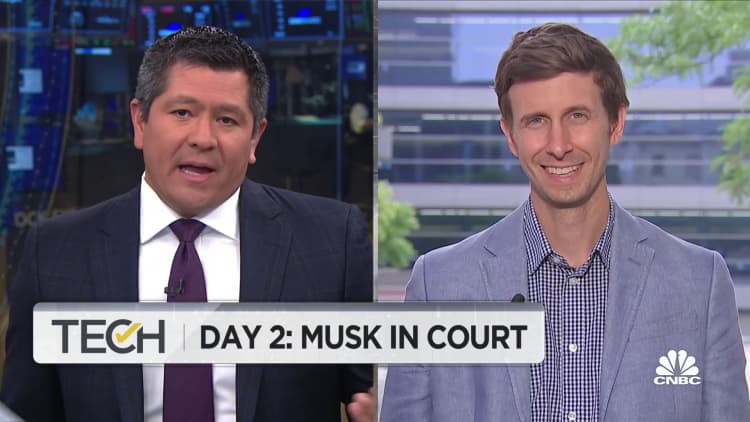WILMINGTON, Del. — Tesla CEO Elon Musk wrapped up his testimony before the Delaware Court of Chancery on Tuesday afternoon, after spending around 9 hours defending his company's 2016 acquisition of SolarCity for $2.6 billion.
Shareholders sued Musk, alleging that Tesla's acquisition of the solar energy installer amounted to a bailout pushed through by Musk, who was chairman of the board at both businesses concurrently. The shareholders also allege that Musk controlled the board of Tesla, even though he appeared to recuse himself from some deal negotiations concerning SolarCity.
If Musk loses the lawsuit, he could have to pay upwards of $2 billion. In this case, known as a shareholder derivative action, the suit is filed by investors on behalf of a corporation, rather than the individuals or funds. If the plaintiffs win, proceeds may go to Tesla and not to the stakeholders who brought the suit.
Just after questioning began on Tuesday, plaintiffs' attorney Randy Baron tried to paint a picture of Musk repeatedly going behind the board's back to get a deal between the two companies started. Musk, meanwhile, insisted that all communication he had around the deal prior to board discussion was meant to provide a full picture.
"This is part of the board process, making sure the board has accurate information," Musk said, once again wearing a black suit, white button-down shirt and black tie.
Musk also denied Baron's claim that he set the price for Tesla to acquire the SolarCity. Baron pointed to notes taken by a financial advisor that showed Musk suggested the board offer $28.50 per share for the company. The board later settled on range of $26.50 to $28.50.

Baron wrapped up his cross-examination around 12:45 p.m. Musk's attorney Evan Chesler then redirected questions, trying to pick through Baron's line of questioning and allow executive to provide more context.
Vice Chancellor Joseph Slight, who will decide the case, followed up with questions around timing of the deal and the importance of an integrated solar product.
"As I understand, one of the contentions in the case is the timing of this acquisition did not make sense for Tesla," Slight said, pointing to issues around the Model X. Musk said the issues at hand, which caused the board to decline to pursue a SolarCity acquisition in early 2016, were solved by mid-2016. Musk said that allowed to board to feel comfortable moving forward with an acquisition.
The day's schedule was changed slightly after it was forced to take an unexpected recess since a member of the plaintiffs' counsel vomited in the room.
Musk's brother and fellow Tesla board member Kimbal Musk followed Elon Mus's testimony, heading to the stand around 2:40 p.m. Kimbal Musk joined Tesla's board of directors in 2004. He also had invested in SolarCity.
Kimbal Musk denied that his brother is controlling of the Tesla board. He added Musk was ultimately recused from the SolarCity vote.
"Compared to most companies I've been a part of, it's a very healthy board," he said.
The SolarCity deal was able to help world understand Tesla's strategic vision, Kimbal Musk said, helping push the company forward from just producing vehicles.
Two days
Tuesday's testimony came after a typically confrontational Musk spent roughly six hours on the stand on Monday.
Musk had repeatedly denied he placed any pressure on the board to go through with the transaction. He added that SolarCity would've been able to raise funds on its own, and the deal didn't amount to a bailout. Musk said the merger allowed Tesla to combine its battery business with Solar City's solar power generation.
Tensions were often high between the CEO and the plaintiffs' attorney. Baron on Monday showed clips of Musk's 2019 deposition, in which Musk repeatedly called the suit a waste of time and said Baron was a "shameful person."
Baron, discussing Musk's conduct, asked if he was "derisive" in his deposition for any reason and said the conduct was "not for some benefit of Tesla or some benefit to achieve something."
"I think you are a bad human being," Musk retorted. He said Baron was "mentored by criminals, then continued to be mentored by criminals."
"That is why I do not respect you," Musk said. "I have great respect for the court, but not for you, sir."



